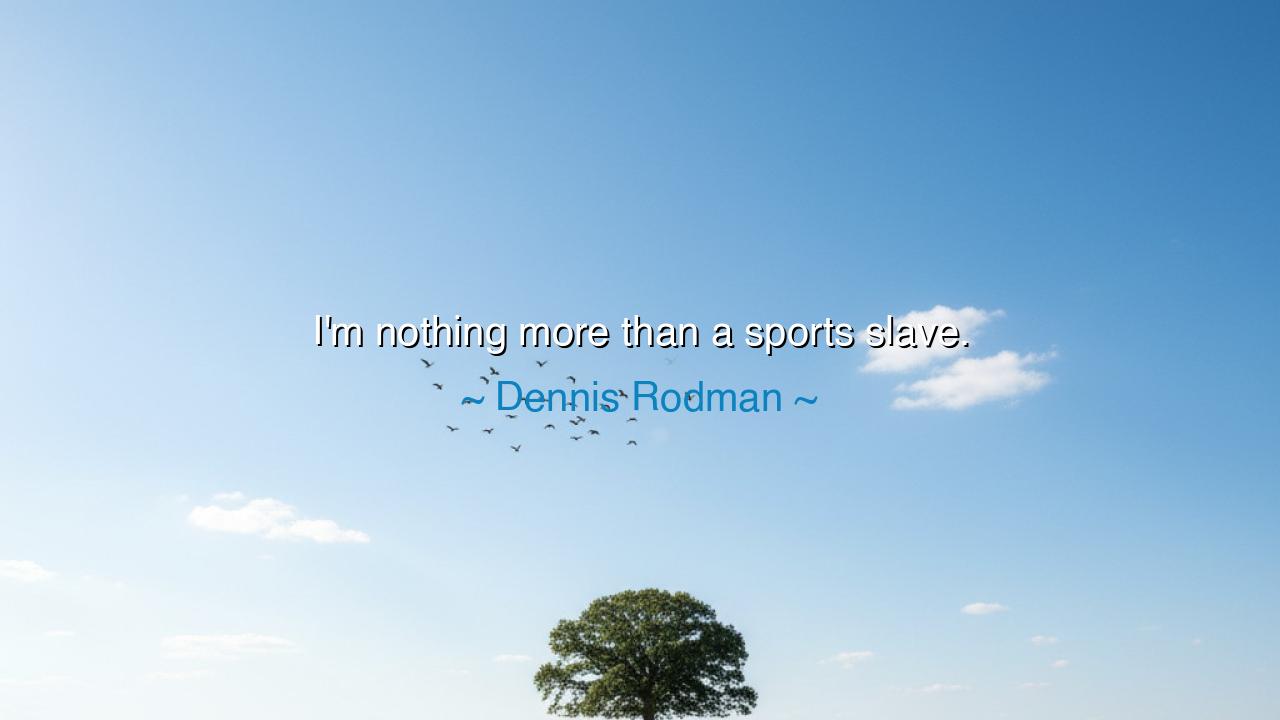
I'm nothing more than a sports slave.






The cry of Dennis Rodman, fierce warrior of the hardwood, echoes like the lament of a chained titan: “I’m nothing more than a sports slave.” In these words lies a truth hidden beneath the glitter of fame: that the athlete, though praised and adorned before the multitudes, may yet feel bound by chains unseen. For beneath the roar of the crowd and the gold of contracts, there often lingers the weight of obligation, of commodification, of a life lived not for the self, but for the appetites of others. Rodman, with his raw honesty, tears away the veil and shows us that glory itself can become a prison.
The ancients knew this paradox well. Gladiators in Rome were exalted as heroes by the masses, their names sung in taverns, their likeness carved in stone. Yet they were slaves still, their bodies owned, their lives traded for spectacle. They bled for the entertainment of others, their triumphs not entirely their own. So too with Rodman’s lament: that in the empire of sports, the athlete may be celebrated as a god yet treated as a commodity, his sweat and spirit consumed for profit, his freedom swallowed by expectation.
Rodman’s career was one of brilliance and rebellion. On the court, he was tireless, a master of defense and rebounds, a warrior who threw himself at the ball with reckless devotion. Yet off the court, he resisted the molds others forced upon him—dyeing his hair in wild colors, living as a spectacle beyond the spectacle. In his words, “sports slave,” we hear not only exhaustion but defiance: the refusal to be reduced to a machine of performance. He reveals the human beneath the athlete, the soul that longs for more than applause and victory.
History gives us another mirror in the story of Muhammad Ali. Though hailed as the greatest boxer of his age, Ali also felt the chains of his role. When he refused to fight in Vietnam, declaring that his conscience stood above his career, he was stripped of his title and condemned by many. Yet he chose the harder path, to prove he was more than a servant to the demands of others. His story, like Rodman’s cry, shows us that the athlete’s struggle is not only physical but spiritual: the struggle to be free, to be whole, to belong not just to the crowd but to oneself.
The lesson for us is profound. We, too, may not play before millions, but in our own lives, how often do we feel like slaves—to jobs, to expectations, to the relentless demands of a society that values productivity over personhood? Rodman’s lament is not only the athlete’s; it is the worker’s, the parent’s, the student’s—the cry of all who feel bound by duty yet unseen in their humanity. His words invite us to ask: What chains hold me? And how shall I resist them?
Practical wisdom flows from this reflection. First, do not mistake external success for inner freedom. Guard your soul against the chains of others’ approval. Second, find spaces where you are not consumed but renewed—whether in art, in prayer, in friendship, or in solitude. Third, dare to speak your truth, even if it shocks the world, as Rodman did with his outspokenness. For silence in the face of bondage only deepens the chains, but honesty may break them.
So let us heed this paradoxical teaching: even amid wealth, one may be enslaved; even amid struggle, one may find freedom. Rodman, in his anguished honesty, teaches us that victory is hollow if it costs the soul. True greatness lies not in being owned by the applause of others, but in claiming one’s own humanity, even at great cost.
Therefore, live not as a slave to the expectations of the world, but as a servant of truth, of integrity, of your own deepest calling. For only in such freedom will your labor, whether in sport or in life, rise from mere survival to the dignity of a life truly your own.






AAdministratorAdministrator
Welcome, honored guests. Please leave a comment, we will respond soon